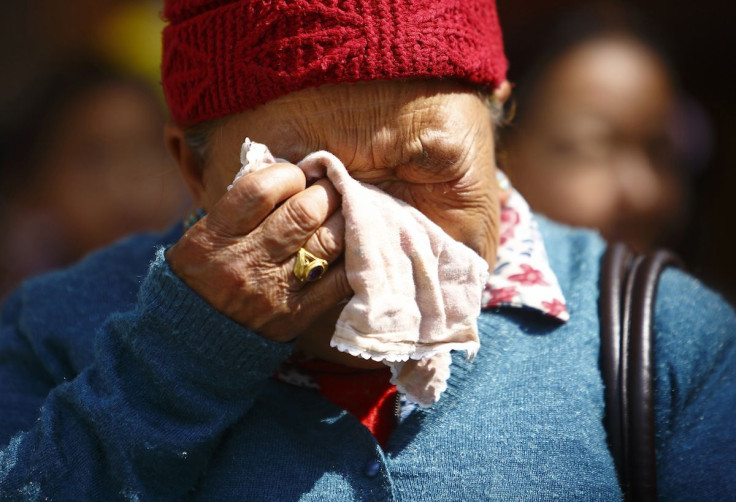Sherpa Guides Demand Changes After Deadliest Day On Mount Everest

The Nepalese government will consider canceling all expeditions up Mount Everest for the remainder of the 2014 season out of respect for the 13 Sherpa guides who lost their lives early Friday morning in the deadliest single day on the world's highest peak. The announcement on Sunday came as rescue teams said they'd abandoned their search for three more Sherpas believed to have been swept away with the others in a sudden avalanche sparked by falling ice at 5,800 meters (19,000 feet).
Sherpa guides assist in the carrying of materials and the fixing of ropes for wealthy mountaineersand serve a vital role for Everest's increasing number of inexperienced climbers, but Friday's incident near the notoriously perilous "popcorn field" underscored the very real dangers they face in ushering foreigners to the "top of the world."
Eighty-six Sherpas died working on Mount Everest between 1922 and 2013. Twenty-seven of those deaths were the result of avalanches and most occurred during the busy spring season.
According to the Nepal Mountaineering Association, a group of Sherpas gathered at Everest base camp Sunday and issued a seven-day ultimatum to the government to address their growing demands over security and remuneration. The Sherpas have threatened to stop climbing if the Ministry of Culture, Tourism and Civil Aviation does not meet a list of 12 requests, which include increased compensation for injured mountaineering workers, a doubling of insurance coverage and a rise in work death benefits from $400 to $10,000.
The Sherpa guides also asked that the government not take any action against the so-called "icefall doctors" if they refused to fix ropes and ladders on the route this season or to forbid expedition members from calling off the climb altogether, if they wish to do so.
More than 300 Sherpas have reportedly signed a petition asking the government to suspend summit attempts for the remainder of the season out of respect for their dead colleagues. The government has yet to make an official call on the matter.
"This is an unprecedented situation," tourism ministry spokesman Madhu Sudan Burlakoti told journalists in Kathmandu Sunday, according to the Guardian. "We do not know what to do if [the expedition teams] want their tax back. We will hold further discussions before deciding anything on this issue."
Sherpas belong to an ethic community of people from the Everest region whose lives have been forever changed by the mountain that looms over their homeland. Intrinsically linked to the adventure tourism industry on the world's tallest peak, many Sherpas were angered by the government's meager offering of $400 to the families of the victims of Friday's tragedy. They said the payment would only cover funeral costs and was too little given the great deal of money the government makes off the Sherpas' contributions.
Mountaineering fees are a vital source of foreign revenue in the impoverished nation of Nepal, which manages the more popular southern route to the peak. Roughly 4,000 climbers have reached the top of Mount Everest since New Zealander Edmund Hillary and Sherpa Tenzing Norgay first conquered the mountain in 1953, and some 334 hopefuls from 41 countries forked over $11,000 apiece for their permits alone in 2014.
The greater economy of Mount Everest is estimated to be worth tens of millions of dollars each year, and in the wake of Friday's tragedy, several expedition companies, politicians and leading Sherpas have called on the government to improve compensation packages for the 400 odd people who work as support staff. They argue that Sherpas receive a salary that's hardly in proportion to the inherent risks of the high-altitude job.
"Sherpas are the backbone of Mount Everest expeditions but the government neglects them," Mingma Sherpa, of Seven Summits Treks, told the Himalayan News Service on Saturday. "We the Sherpas strongly urge the government to immediately act to support the families of deceased Sherpas. A permanent mechanism at government level is required."
Sherpa guides can make up to $6,000 during the three-month climbing season. While this is well above the average annual income in Nepal of $750, it represents only a fraction of the trekking fees paid by each foreigner, which can easily exceed $100,000.
In February, Nepal lowered the cost of its individual permits for climbing the world's highest peak from $25,000 to $11,000 and abolished group discounts that it said created excessively large expedition teams. Critics, however, fear that the lower fees will only entice more climbers to an increasing crowded mountain.
Tensions broiled over last year after three European climbers attempted to pass local guides who were setting up ropes for an expedition team. The ensuing "brawl" made headlines around the world and highlighted the seemingly bizarre issue of traffic jams at the top of the world.
The Nepal government overhauled its mountaineering policies earlier this year and installed government personnel, soldiers and police at base camp to resolve conflicts and aid in any problems. But these measures could do little to prevent Mother Nature from wreaking havoc of its own, nor could they stop the Sherpa guides from demanding more from a government they say has neglected their needs.
© Copyright IBTimes 2024. All rights reserved.






















